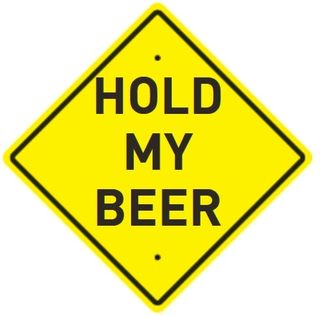Creativity
Comfort with RISK is an Acquired Taste
What level of risk puts you in the un-comfort zone?
Posted November 19, 2018
When I was seven years old, I went into the woods behind my house, built a fire, then fried an egg over it in an old pie tin. When the egg was done, I ate it. I didn’t even like eggs, but because I had cooked it on my own, it was delicious. I was so proud of my achievement that I ran inside and told my father. The look on my Dad’s face was horror, and I immediately expected to be severely scolded, but he didn’t. Instead, he said, “Wow, that’s quite an accomplishment. Why don’t you show me your campfire.”
He followed me into the woods, and saw that I had properly put the fire out. I still recall the look of relief on his face. He then praised me some more, and finished by saying, “That looks like it was a lot of fun; but next time you want to do this, please include me.”
From the look on his face, I got the message loud and clear. He was concerned about me “playing with fire,” and wanted to chaperone me if I did it again. The point of this story, however, is that he didn’t yell at me. He didn’t tell me how hazardous it was, how I could’ve set the woods on fire, or burned myself. In short, he didn’t plant the seeds of fear that could’ve made me risk averse in the future.
It’s not just overprotective parents who admonish us. There are plenty of other people sowing those seeds. We are inundated daily with warnings not to experiment, investigate, or stretch too far. And, then there are dozens of old proverbs designed to motivate caution, here are just a few:
* curiosity killed the cat;
* better safe than sorry;
* better the devil you know than the devil you don’t;
* be careful what you wish for;
* don't sail out farther than you can row back;
* buyer beware;
* when in doubt, do nothing;
* you never know what lies right around the corner;
and my all time favorite from comedian Steven Wright: “Eagles may soar, but weasels don't get sucked into jet engines.”

Even the phrase “Hold My Beer” is used to disparage risk-taking, or make fun of those who do take risks. Risk-taking, however, is important in many ways, from creating successful businesses, to developing and growing emotionally.
Fear of risk is frequently fear of change, and that can lead to controlling behavior. People and institutions can get set in their ways. Ways that were profitable in the past, but may not be today. In order to move forward - to innovate - one must be willing to take risks.
The problem of risk-aversion begins as we grow up, attend school, and go through the socialization process. During that time, we are constantly told to conform. When we don’t conform, we are frequently chastised or shunned by our friends, family, and classmates. Those early days of peer pressure and the associated fear of being taunted, laughed at, or bullied stay with us well into adulthood. And, that fear of what other people think of us, can keep us from taking risks. But, we shouldn’t let that happen, because as American businessman Olin Miller observed, “You probably wouldn't worry about what people think of you if you could know how seldom they do.”
There’s nothing wrong with assessing risk before you act. It helps to understand what can be lost, if the risk you take leads to failure. However, for something to be a risk, there must be something that can be lost. What are you putting at risk? What could you lose? Time? Money? Comfort? Friends? Reputation? Freedom? Life or limb? Finally, can you afford it? Maybe it’s not as big of a risk, as you first thought. So what if you’re embarrassed, throw away some money, or waste some spare time. Oftentimes, risk is a matter of perspective. Go ahead and visualize the worst that can happen, then prepare yourself for it. And, keep this advice from Albert Einstein in mind, "Anyone who has never made a mistake has never tried anything new."
Many people, when they get older, regret not having been more bold when they were young. They will say things like, “I should’ve auditioned for the school play;” or “I wish I had tried out for the football team;” or “I could’ve participated in the science fair or math competition, but I didn’t;” or “If only I’d asked out that pretty girl I really liked.”
The trick is getting comfortable with risk. It helps to understand that it will feel uncomfortable at first, and that you will get used to it. The problem is our imagination makes us believe that failure will be worse than it actually is. Failure can be a good thing, if we learn from it. John Dewey understood this when he said, "Failure is instructive. The person who really thinks learns quite as much from his failures as from his successes."
Risk-takers didn’t get there overnight. They built up a tolerance for it over time. You will become more comfortable with risk, the more often you take one. One success will lead to another, and you’ll feel better each time. A shortcut for this is to hang out with people who are risk-takers. Before you know it, they will have you skydiving, snowboarding, or mountain biking, or maybe just riding that scary-looking roller coaster.
There is an old proverb which says, “No risk no reward.” And, it’s true. The biggest risk is never taking one, because without risk you won’t find opportunity.
You can get more comfortable with risk by taking small inconsequential ones. Here are a few easy ones to get you started: If you drink coffee every day, switch to tea for a week. If you always listen to pop music on the radio, switch to country, jazz, hip hop or classical music for a month. Rearrange one piece of furniture in your house. Read a section of the newspaper that you’ve never read before. Read a magazine on a topic that you know nothing about. Take a continuing education class in a subject not related to your career. Join a hobby or study group on MeetUp.com. Taste a new food - maybe an ethnic food - that you’ve never tried before.
Don’t let risk aversion keep you from living your life to the fullest. Try something new today.
Robert Evans Wilson, Jr. is an innovation/change speaker, author, and consultant. He works with companies that want to be more competitive through innovation and with people who want to think more creatively. For more information on Rob, please visit www.RobWilsonSpeaker.com.




